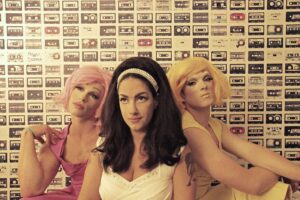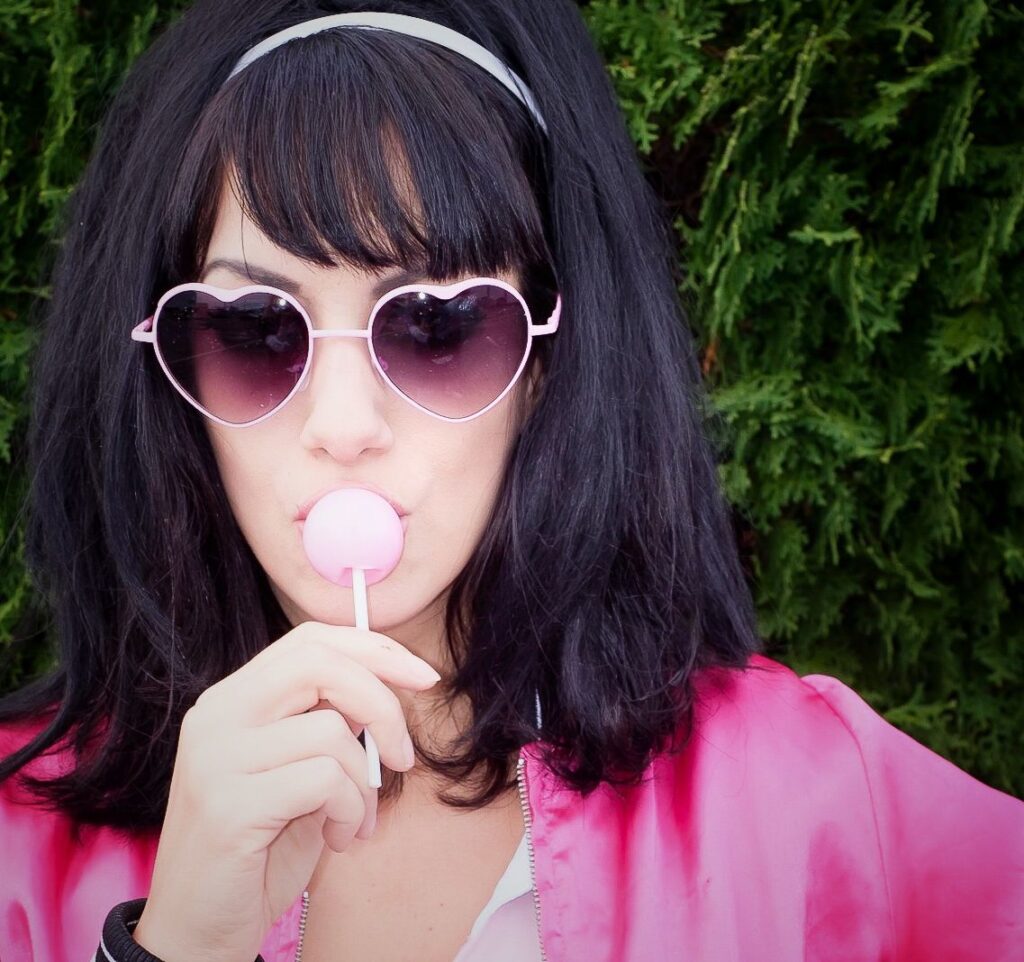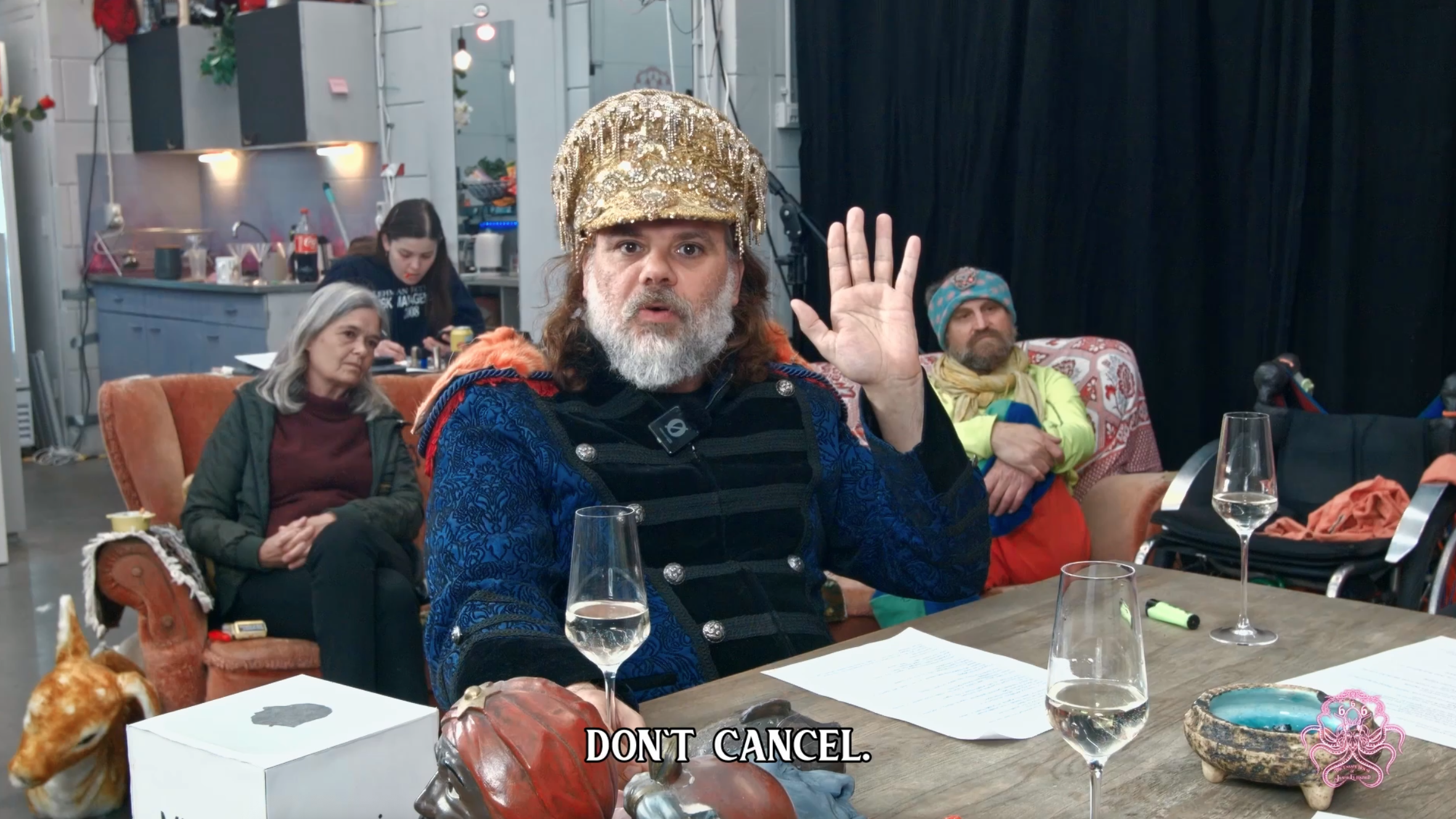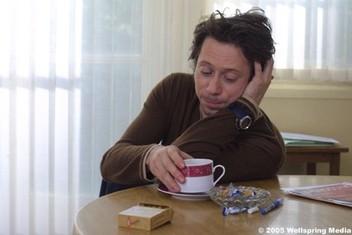Seattle’s Celene ‘Leeni’ Ramadan is a vivacious talent who has her fingers in many cherry pies. As the lead singer of Prom Queen, Leeni delves deep into the ‘Americana’ dream, combing light and darkness with cinematic retro pop, a genre we can safely now label as ‘Doom-wop’. Prom Queen’s last album tells us as much. It’s an ever-evolving style but put simply, it can perhaps be best described as rockabilly combined with Albert Camus’ ready-made blend of existential despair. That’s my take, at least, and Leeni agrees, so there you go.
In a (another lengthy Felten Ink) interview, we discuss Leeni’s music in Prom Queen, overcoming the nerves to get onstage, what ‘Doom-wop’ actually means, as well as her comedy career – where she dresses up in a bunny costume. I wanted to ask if she was drawn to the ‘Furries’ lifestyle but my manners (and cowardice) kicked in.
To begin, we obviously address the fucking Covid-19 fiasco.

Leeni – have you ever had a near-death experience? (Interviews sometimes need an ice breaker)
Wow, that’s certainly an ice breaker! I can’t recall any scary brushes with death but one could argue that life itself is a near-death experience.
Do you believe in God, religion or the supernatural?
I believe in universal energy waves and connectivity between all things. I don’t subscribe to any religion. It’s a loose belief system, but I acknowledge that I believe in something connecting us all.
Given our current circumstances, how are you coping with the lockdown situation?
My experience has been very eventful: lots of family, personal, and logistical shifts have occurred during this time as well as work and some creative stuff. It has not been dull, in fact, I hope it gets a little duller for me. Everything hard is just *that* much harder to right now.
What are you missing the most and what is your current routine like?
I do miss live music, both the performing of it and the experience of it. But I mostly miss people and travel. I am pretty well cut off here and this is a city full of people I love so dearly. I just want to see them again and share space with them and to hear about their lives outside the confines of their homes. My lockdown life is not incredibly dissimilar from my regular life. As a freelancer and artist, I often find myself with big swaths of unstructured time, and my habits were formed many years ago as to how I prefer to deal with it. I love to spend a lot of time outdoors listening to podcasts during the day. I love to run and go for long walks. And then, if I am feeling inspired to create I go to my studio, and there I can either make music, or do something with video or comedy, or dance. I used to paint velvet paintings and I have been toying with getting back into that during lockdown.
How has your ability to make a livelihood been affected?
Like I say I am a freelance video editor and a composer. For both, I’ve been able to work during lockdown and that is a great thing. I’ve never been a musician who relies on live shows or any aspect of my music career to pay my bills. Just out of necessity, I’ve always worked. I feel lucky to have a career outside of music that helps support me at this time. Every once in a while, my music career takes over and I get a great gig or something and it feels amazing to make money from my art, but it’s just not a constant.
What’s life like having Trump as commander-in-chief?
It’s just a daily reminder of how we can’t completely disengage from our civic duties and from our responsibilities to each other in our communities. It’s a motivating factor for me to stay more informed on what is going on and to be more diligent about language, about where I’m getting my news, about how I’m choosing to interact with the people in the world with whom I do not share the same ideologies. But for me, he’s just a big, orange, nasty alarm clock sound that cannot be snoozed. So I’m like, “Ok ok ok, I’m awake.”
I stumbled upon Prom Queen and was immediately drawn when I listened to your record ‘Doom-Wop’… it’s an interesting genre…
Doom Wop was an exploration of a darker side to American nostalgia for me. I’m a big fan of [David] Lynch and I feel he explores similar themes in his work. Doom-Wop also, quite literally, describes the sound. I said the record was “Leslie Gore after she binged-listened to The Smiths”. Many of the lyrics of those old songs from the 50s and 60s are pretty “on the nose”, as they say – about a boy who didn’t call you back or about wanting to run away and get married but – oh no! you’re too young! With ‘Doom-Wop’ I aimed to take the nostalgic sound but add in darker themes, anxieties, and love stories that don’t often have a happy ending.
To me, the genre of ‘Doom-Wop’ kind of comes from a combination of rockabilly mixed with existentialist Albert Camus-inspired despair… maybe I’m talking nonsense…
No, you’ve got it! When I was writing the record, I came across this rare old doo-wop song called “Vengeance” by The Matadors. The lyrics start out so typical of that time period with “you broke my heart…right from the start…you made a fool of me in front of the crowd” but then, turns so sinister with the chorus “…and Vengeance will be mine”. It blew my mind! We covered it on the record, but this, to me, is the quintessential Doom-Wop song! It’s the rotting wall behind the Normal Rockwell painting.
What interests you most as an artist?
What’s most important to me is being open and inspired, following that inspiration, remaining honest and vulnerable, and always evolving and pushing myself to do things a little differently every time.
How has your relationship with music changed over time?
My relationship with music one of the only constants in my life. And yet, I have a very detached relationship with my music. I go for very long periods without writing or performing. It’s like the old saying “if you love something, set it free…”. I fully become a non-musician for long periods of my life. I have many other passions. But it doesn’t worry me or make me feel anxious. It’s part of the process for me. I know I’ll always come back once inspiration truly strikes and I’m fine waiting it out until it does. It’s better to engage with it when I’m a little starved for it.
Your music reminds me most of Holly Golightly. Who else are you channeling?
I don’t really think about music that way. I’m channeling myself.
Why, when, did you first feel the need to be creative?
I’ve been playing guitar since I was 14, and I sang in different choirs growing up and always loved karaoke. I knew I wanted to make my own music but I felt largely blocked about how to go about songwriting and even performing music in earnest. Karaoke was easy cause it was goofy and fun, but to try to sing a song sincerely in a room full of people was terrifying to me. Interestingly, it did come to me in a moment in a college class.
Which was?
I took a class at UNH from a professor named Lawrence Rosenfield who had an unconventional approach to teaching Interpersonal Communication. The class often felt more like group therapy, so much so that it enabled me to quit my sessions with the campus therapist that I had booked following a bout of insomnia. His class ended up helping me sleep but also helping me in other ways that were so transformative and that had lasting effects for the rest of my life.
In one class, we did an exercise where we all closed our eyes and imagined, down to the smallest micro-level, how it would feel to be in a doctor’s office and receiving the news that we only had six more months to live. We were prompted to try and feel how our hands would feel, how our labored our breath might be, what our first words of response could be after hearing our fate. Then, piece by piece, walking through the moments to follow until we were finally alone for the first time with this shattering piece of knowledge. And the question that loomed in that moment was “what would you do with your final six months of life?” With speed and clarity, my brain immediately snapped with an immediate answer: I want to sing. Prior to that moment, I hadn’t written or performed any of my own music ever in my life. And after that moment, I did everything I could in pursuit of making that my life’s work, and that’s what I’m continuing to seek out today.
In previous interviews, you’ve spoken about nerves you felt to actually get on stage. How did you overcome that barrier?
The shyness and fear from those first few attempts of singing in front of people was significant. My process as an early songwriter was to use my comfort zone of comedy to write funny songs. I learned the mechanics of songwriting through doing that and then, one day, I wrote something that wasn’t funny. And I really liked it. And then I kept doing it. I liked the songs a lot and when I could share them with other people, they liked them a lot, too. I grew more confident as people responded to my songs. It was a long and gradual process. But now, I am more comfortable singing in front of a room full of people than I am doing most other things. 12 years delivering singing telegrams will also do that for you (that was a side job of mine for a long time).
When did you first realize the creative possibilities that music could offer you?
I always knew I wanted to do music, but I found it very difficult to sit and write my own songs. I could only play other people’s stuff and I was far too nervous to perform. My father very suddenly passed away two months after I moved in with him in Seattle. After the grief and difficulty of that first year, I finally was able to write my first songs in 2005 and I just never stopped since then. It’s been a wild ride ever since those first recordings, but I’ve never wanted to stop no matter how hard it is to be a musician. There’s never been a question that it’s a part of my life forever.
What was your upbringing like – I understand your father is from the middle east?
Yes, my father was born in Egypt. He was a drummer and a singer, playing Beatles covers in his band as a teenager. He left Egypt and emigrated to San Francisco in the early 70s because he saw it on a TV show, “Streets Of San Francisco”. My mother had just fled her childhood home in Connecticut to experience more of the world, and landed in San Francisco at that same time. They met at the Starlight room in the Sir Frances Drake Hotel, a place I was able to visit for the first time a couple of years ago. They moved back east together, got married, and started a family. My parents divorced when I was just 2 years old and my father moved back to the west coast soon after. My 2 older sisters and I were raised in the Northeast with our mother and soon after, with our stepfather Chuck. Growing up, we were encouraged to play music so we were a very musical family. I also loved acting and comedy, which is something I also do to this day. My father ended up living in Seattle a little later in my life and that’s how I ended up here once I was ready to leave the northeast after college. I’ve been here since 2004 and it is truly my home.
What are the plans for Prom Queen?
I have some grand plans for future projects that I am slowly working on. It’s really hard to plan for much of anything anymore, but I know I’ll be making more music. I can’t wait to be in the same room as my bandmates again and to play together. What a wonderful feeling that will be!
What’s been the biggest obstacle for you, in your band?
The biggest obstacle is lack of support and money. There’s so much we could do if it weren’t for that. I am proud of what I’ve been able to do and proud of us as a band, but we have been limited. We would have done lots more touring if we had management or bookers or anything. But it all bottlenecks to me. I am the writer and producer, the band manager, the booker, the PR/social media person, the bank account, video creator, etc and so forth. We’ve had interest from labels here and there but nothing ever cemented, and it was fleeting. So I assume all the roles. But after years and years of doing everything, it just gets exhausting. So, I take breaks when I need to and only work on stuff when I want to. It’s the only way to sustain it for me and still have it be something that I love to do.

I was interested to learn that as well as being a musician, you’re also involved in comedy, with ‘Snax’ the bunny?
I’ve always been into comedy since I was very young. Being funny was how I could make friends with people who were older and cooler than me. I started doing improv and sketch when I was still in high school and continued that through college. I also entered and won some standup competitions during that time. I won the title of “Portland’s Funniest Comedian” in Portland, Maine while still in college and won a “College Comedy Bake Off” and got a free spring break trip to Florida for me and a friend. At 19, I dipped my toe in the Seattle scene when visiting my father for one summer. I was indoctrinated into Jet City Improv immediately and they became my awesome Seattle family, which cemented my desire to move there as soon as I could. The day I moved to Seattle in 2004, I flew in and went straight from the airport to my audition and we made the relationship official when I became a cast member. From there, I performed and directed shows, and even became director of my own improv-turned-film group, The Beta Society. We started as an improv comedy group, then integrated video into our live shows, then just became a group of people that made whatever videos we wanted. It was loose and fun. We ended up renting an actual mansion together and it was one of the best times of my life. But it started becoming harder and harder to get people together to make videos where no one was making money. We decided to fold the company and I refocused on music and took a BIG hiatus from anything comedy related. But I always missed it.
Many years later, I was browsing eBay for mascot costumes. I just…wanted one. I think they are so funny and I always had a dream of performing standup as a mascot. I bought the bunny costume on eBay and it sat in my closet for 2 years and I never did anything with it. Then, my good friend Rachel Belle and I were having coffee one day and we both wanted to get into standup so we challenged ourselves to do it within the next month. We both did. And Snax was born. I continued to perform as Snax The Bunny around town, and then I applied to ABC’s The Gong Show and made it onto the air and it was one of the most terrifying yet greatest experiences of my life! It was pure joy and fun to do something so absurd, and something creative that had nothing to do with music, but still satisfied me at s soul-level. Snax has a podcast and hosted a monthly variety show here (before lockdown) and got to perform at some great shows in Seattle and LA. It’s a blast! It’s so much fun and my own way of celebrating the absurdity of life, to remembering levity, to showing a side of myself that people don’t often get to see through my music. It’s really made me feel whole again.
A bunny costume be tough for a start, what with the heat factor?
I run pretty cold so the heat hasn’t been too big of a problem. I love being in the suit – if you’ve never worn a mascot costume, I recommend it. It’s very fun! What I love about it is that it erases me. The bunny is my comedy vessel, but it’s not colored by my physicality at all. Sure it can be tricky to have impaired vision, but I’ve been able to make it work for the most part. And all the little mistakes I make are totally hilarious because I’m a giant bunny. So, when I can’t read something, or I trip or walk into something – it’s all part of the act.
These days, certain types of comedy is deemed unacceptable. There’s a cancel culture going on (certainly in the UK) where if you say or joke about the wrong thing, the ‘mob’ mentality can kick in and go on the attack. What do you think about that?
Snax is a benevolent and naive being. The character I created puts out a pretty positive, inclusive, cute, and loving energy. People are hurting and I don’t want to add to that hurt. I want to add levity, absurdity, joy, and silliness to the world. But I don’t think I am sacrificing humor to make that happen. My goal is to make everyone feel welcome, loved, and accepted so we can all laugh together. It’s nicer and a lot more fun that way. If I ever make someone feel bad by something I say on stage, I would probably re-write or retire the joke entirely.
On the back of that – what in your own life or experiences impacts your comedy?
Comedy comes from observing things in life and focusing on those shared experiences through a funny lens. Particularly, observing small details in people’s interactions, in our pop culture, our marketing, on the language around self-care, and the ideas that we share with each other through social media. There’s also a lot of word-play. I love language, and with both of my pursuits: music and comedy, they are an exercise of my love for precise language.
Leeni, thank you.
Listen to Prom Queen on Spotify


